#with changed perspectives and story and cinematography
Explore tagged Tumblr posts
Text
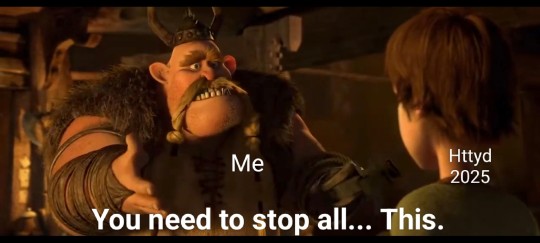
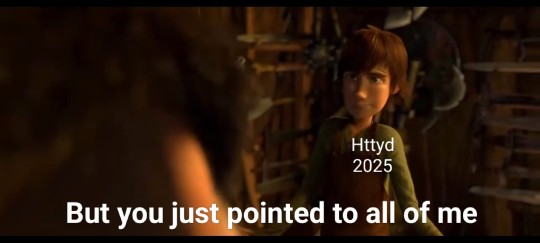
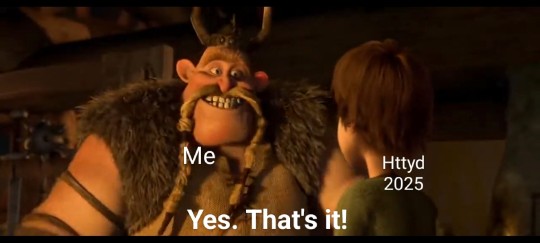
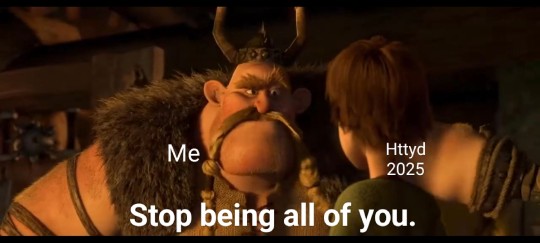
I don't care how excited it might make some people, I don't like this remake
#no heart. no effort. no soul. it looks animated everytime cinematic scenes of Berk or the dragons shoe up what was the poiiint#httyd 2025#aweful set and costumes. barely any cool details. dry emotions. no man i hate it#httyd live action#httyd#how to train your dragon#the only good thing this is bringing that it's giving me a chance to wipe the memory of thw from my mind#lf btw. look at the fur detailson gobber's vest and also the lighting#in these screencaps#try and compare this to whatever the hell they're doing with the remake. is any of it present? no#it looks vooler and better in the animated medium#amd it would've looked good in live action if it wasn't a remake and had good artwork done with some heart to it#like. i can actually imagine a live action httyd looking amazing but not as a remake but as a book adaptation#with changed perspectives and story and cinematography#hey can't replicate the masterpiece#and you know what pisses me off even more?#They based Toothless on his THW model. not even the first movie's model#his movements are all so... wrong
2K notes
·
View notes
Text
Hi so a lot of people are talking about how horrific Emilia Perez is from a Latin American perspective, which is really interesting to read. It’s not my place to way in on whether or not it is a good movie from that perspective.
BUT, I can weigh in on the trans perspective, and from that aspect the movie is, to borrow from the native tongue of the direct, tres shit. To start, the titular character spends the entire first act being aggressively misgendered. Everyone, and I mean EVERYONE, from the lawyer she hires to scout perspective clinics for her “sex change operation” (more on that in a second) to the actual fucking workers at the hospital she decides to have her operation at constantly refer to her with masculine identifiers, including a song where her lawyer refers to her as Mr Mystery while speaking with the surgeon and convincing the surgeon that Emilia is eligible for the “sex change operation.” FURTHER, when we meet Emilia, she’s been on HRT for two years with seemingly NO effect on her body. The film aggressively makes sure that Emilia is presented in masculine clothing, voice, and presentation before she truly “changed her sex” through the “sex change operation.” SPEAKING OF, this mystical fucking “sex change operation” is actually six different surgeries that would require weeks, if not MONTHS of recovery in between operations. The one surgery Emilia has is a orchiectomy, vaginoplasty, breast augmentation, rhinoplasty (bc big nose means man? nice casual antisemitism with your transphobia), facial feminization, and an Adam’s apple reduction (in the parlance of the movie). This is an absurd amount of plastic surgery to be done within a single procedure and it shows a dangerous lack of understanding of not only trans and gender affirming health care but also just like… surgery in general??? Finally, after the “sex change operation”, the movie finally lets Emilia present femininely and wear gender affirming clothing, as if to say that trans women/trans femme people EARN the ABILITY to wear gender affirming clothes by having massive, invasive, and expensive surgeries, and it’s only by having these surgeries that you can match your “anatomy” to your gender presentation. Long and the short, the understanding of trans shit is FUCKED, and it’s absurd that Dog Day Afternoon seems to have a better understanding of trans issues than Golden Globe Winner Emilia Perez.
And that’s before going into the fact that the movie is not presented competently at all. The cinematography is bad, the lyrics are contrite, the choreography seems to have been done by a chimpanzee with a ketamine dependency, and the script itself just lacks a compelling story.
Anyway, all this to say, fuck Emilia Perez. If you want trans centered cinema, go watch I Saw The TV Glow. If you want a movie musical, go see Wicked again.
107 notes
·
View notes
Text
Childe’s Story Quest: theme, storytelling, form follows function
Content Warning: self-destructive behaviour, mentions freezing and mutilation
Spoilers for the entire quest.
—
Showing both Teucer’s and Tartaglia’s perspectives throughout the quest sure reveals more about Tartaglia.
The quest on so many levels conveys its theme: the divided perspectives between a naive childhood lens and a disillusioned (??) adult lens.
One is unknowingly caught in a wonderful yet deceiving story (the tone and form), the other sees reality for what it is but tries to maintain innocent childhood dreams with these stories (the content and meaning).
Tartaglia was once the former, and is now the latter.
—
For example during the hide and seek cutscene, the tone set by the soundtrack “Foul Legacy” and the flashy cinematography & visual effects is very adventurous (in an anime way).

This is how Teucer views Tartaglia. (Teucer literally shuts his eyes and thinks it’s all a game.)
But the reality of the situation is shown moments before, where we see Tartaglia looking all soft and mortal against the dangerous Ruin Guards right behind him. Like, if you didn’t know what the game is, you’d think this is a moment of dramatic irony where the boy is gonna die because he doesn’t seem to notice the big scary automaton right behind him.

And it’s not that he’s weak in general, but in this specific moment he just defeated a few dangerous automatons, and he’s about to use his physically draining technique to fight off even more of them under the limit of ten seconds—all for the sake of protecting his kid brother’s innocent dream.
—
But really, this divide between childhood and adulthood is shown straight from the beginning. And I think the whole quest could be summed up with that nursery rhyme:
拉钩拉钩不许变,变了丢他去冰��。冰川冷,雪原寒,撒谎的舌头都冻烂!

The Chinese rhyme scheme is ABCBB.
Literally speaking it’s
Pinkie promise, pinkie promise, [you’re] not allowed to change [it], change [it and we] throw him [onto] the glacier. The glacier [is] cold, the snowfield [is] cold, lying tongues all freeze [and] rot!
(Note that 丢 is a verb that could either mean to throw away or abandon [something physical or abstract]. The syntax here is a bit odd because it’s a nursery rhyme. 丢他去冰川 doesn’t have a preposition so I’m not sure if it’d be “throw him onto the glacier” or “throw him into the glacier’s river”. Also, 冷 and 寒 are two different adjectives that both mean cold, essentially.)
But if I try to rhyme it with a bit of rhythm then it could be something like
Pinkie promise, pinkie promise, you’re not allowed to change it. He who goes back on his words gets thrown onto the glacier. The glacier’s cold, and so’s the snow. The tongues that lie shall freeze and rot.
English dub equivalent:
You make a pinkie promise, you keep it all your life. You break a pinkie promise, I throw you on the ice. The cold will kill the pinkie that once betrayed your friend, the frost will freeze your tongue off so you never lie again.
Rhythmically and tonally it sounds like a fun and naive nursery rhyme (emphasized when the innocent Teucer first says it at the start)—but the content is about the fatal consequence of breaking a promise… especially as a Snezhnayan (emphasized when the traveler and Tartaglia repeat at the end after the near fatal situation in the factory).
Ohh, so a character’s theme could also be done this way.
—
In hindsight as I was explaining how 丢 could refer to throwing away something physical (e.g. an object) or abstract (e.g. dreams), the person in the nursery rhyme could easily be a stand-in for childhood dreams, huh…
A childhood dream that promises to never change, but ends up changing anyway, so it gets abandoned at the glacier and is left to freeze…
拉钩拉钩不许变,变了丢他去冰川。冰川冷,雪原寒,撒谎的舌头都冻烂!
As Paimon says, “Wow... That one nursery rhyme kinda says all you need to know about Snezhnayan culture…”

Miscellaneous first reactions of third act
Teucer takes the path straight into the factory but the door immediately closes, so Childe is forced to enter from the side with a more difficult path
What goes into a world of danger and unknowingly get trapped? What has to use more lopsided methods to sneak in just to protect… Teucer symbolizes childhood innocence, and Childe is adulthood?
Hm, that overhead shot of tiny Teucer running into the factory with Childe and Traveler watching from higher grounds behind bars— It’s like Childe watching his younger self… rushing into the forest and into the abyss? Oh, and consistently Childe is forced to take the dangerous route and face all the difficulties while being unable to reach Teucer.
aw…
Paimon and the traveller witnessing Childe’s moment of vulnerability yet still needing to keep up the toysalesman illusion to Teucer in the domain is…
(Actually, this feels similar to Thelxie’s Fantastic Adventure where Zuria is optimistic about the plan and Freminet later pulls the two aside to tell them the truth about the condition)
Well, both have the theme of keeping up childhood dreams with stories don’t they
Wanting to keep up the illusion longer and not wanting to let Teucer see his weak side of him, huh…
Yet still wanting to fight the traveler in the future despite still recovering from a serious injury. What kind of self-destructive tendency is this
Ah, the idea of meeting Childe in his home turf is interesting considering Snezhnaya is so far from Liyue
It’s all so sad. Why does he trust the traveler this much even though they’re on opposite sides and fought in the Liyue archon quest not long ago
#I wrote this back in June#but yknow#for the treasure hoarder entrance exam in the second act#in-universe Childe of course aces his test#but using trial Childe I had to do the run three times#genshin translation#(at the end. for the nursery rhyme)#genshin impact#Genshin meta#storytelling#genshin analysis#dusk analysis#Childe#Teucer#Tartaglia#protector of childhood dreams#q
74 notes
·
View notes
Text
i know Bastogne is universally recognized as the Best band of brothers episode and listen, I get it and also agree in the sense that the story portrayed is the most interesting and overall it's incredibly well written. but I'd just like to point out the excellence that's episode 5, "Crossroads."
(Crossroads is the episode that focuses the most on Dick Winters — ep 1, 2, and later 10 also do but it's not as centralized as it is here — We follow Dick through an anachronistic series of events, and the episode ends with E company moving towards Bastogne. It's directed by Tom Hanks.)
I love this episode because of all the different creative choices it has and how it stands out visually and sonically in comparison to all the other eps. so in technical aspects, it's my favorite of the bunch. this distinction is exemplary in the sequences that go from Dick writing his report quietly in his office to him leading the attack on the SS companies. It's very interesting to me how loud and obnoxious the typing gets for both Dick and the audience after a while; in the battlefield, there's nothing to pull Dick out of his concentration, always the focused leader. he has a mission to do, and he intends to carry it out as smoothly as possible (as seen in this episode). in the office, though, he's distracted, losing track of time, almost physically feeling the noises of the typewriter as if it was the sound of a gun going off inside his ears.
the back and forth between time periods is amazing. the sound design in this episode is my personal favorite (in a show with explosions and rifles, you wouldn't think a clacking typewriter and a man out of breath would be the reason for this). the combined sounds of Dick writing with the gunshots going off, the change in paragraphs with the tearing of the tape? Dick and the company running towards the enemy (clearly screaming) with nothing but the sounds of their breaths and footsteps making noise? just excellent sound design.
also, the cinematography. I could talk for hours about how good this episode's photography and lighting are. there's this particular moment I love after Alley is shown to be hit and bleeding on the barn table, where we immediately cut to Dick writing about this in his report. it's all about the stark contrast between the lived experience of seeing one of your men badly wounded and then simply writing and reading about it.
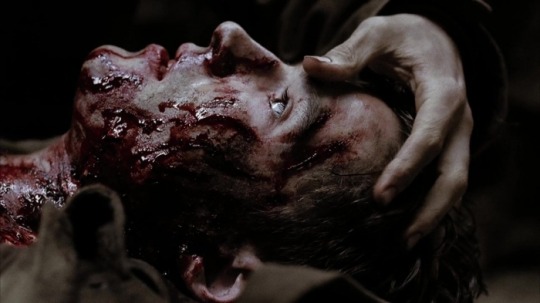
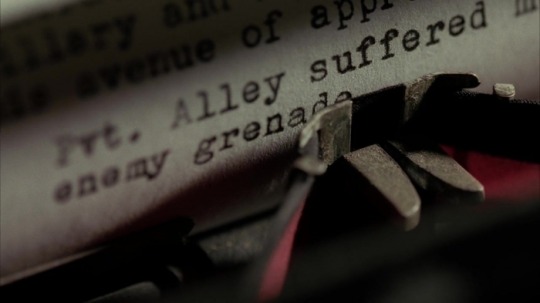
the night shots as well. it's very easy to fail in making a night scene both properly lit but also indicative of the time (some shows make it look dark as shit basically), but band of brothers does it well: in the first pic, you only have the moonlight as illumination, which is not much, but it helps to get you into Dick's perspective of having to go through this mission in the depths of night with such a limited field of vision.
there's several night scenes in this episode, most notably the battle on the Crossroads, but also Operation Pegasus, the night Moose is shot, Dick in Paris, and then Easy company going into Bastogne.
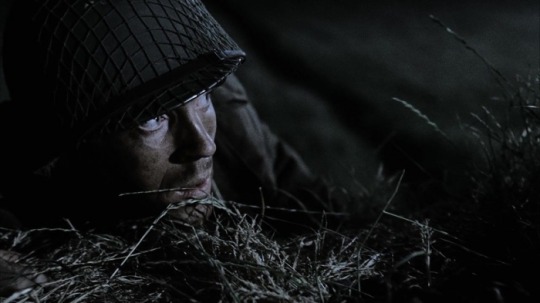

finally, the color grading. band of brothers is a strange show that's always changing in its color grading — maybe the different directors had no prior discussion before filming the episodes, as it happened with the writers' room, but I doubt this — nevertheless, Crossroads' color grading stands out, specially in the long-awaited scene of E company charging against the SS companies.
the high contrast of the dark shadows with the desaturated greens (and later reds) make for quite a sight, especially if you compare it to the warmer tones of the present scenes of Dick writing. the show wants you to know how different these moments are for Dick, who under fire is collected and focused but is ultimately crumbling under the bureaucratic pressure.
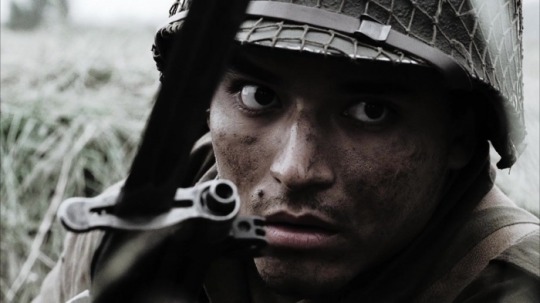
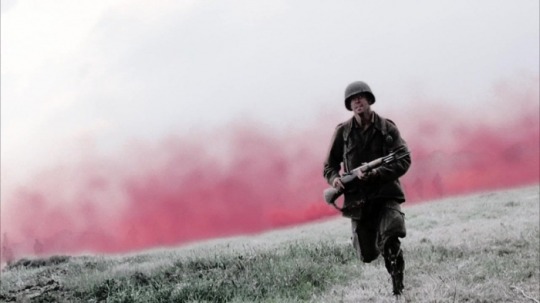
also I freaking love all the shots and framing of the typewriter. nothing to say other than they're cool as hell.
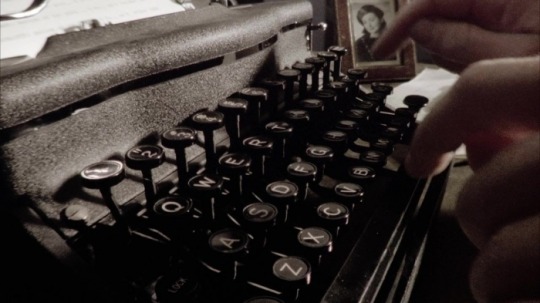
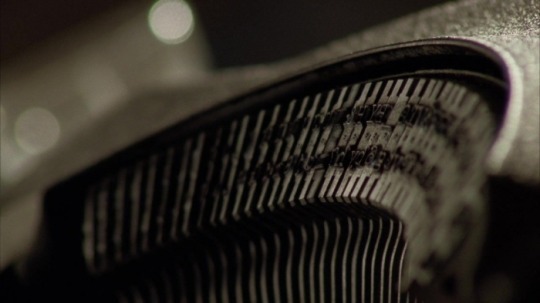
and this isn't even covering the emotional and character-driven aspects of the story! (that's a post for another day, maybe). for me Crossroads is a masterpiece of an episode in what it means to use camera, lighting, and sound to make your story as immersing as possible; it connects beautifully all technical aspects of filmmaking and, in my opinion, delivers one of the show's best episodes (that's accompanied with a great script.)
109 notes
·
View notes
Text
I mentioned the Joanna Nagule interview and I wanted to explore it some more. What stood out to me is the artistic freedom that Chris Storer seems to give to the creators of the show. Joanna mentioned that Storer's directing style usually involves telling her what he wants the audience to feel, and she follows that guidance to help edit the episodes.
The show focuses on delving beneath the surface to explore what Carmy is feeling. Occasionally, the story gives us a break from Carmy's perspective through stand-alone episodes within a season. The editing and cinematography in episodes like Forks and Honeydew differ from the usual fast-paced cuts, overlapping dialogue, and close shots, giving us a change of pace from the chaos.
Chris also has specific directions for the cinematography. He wants long shots to convey the feeling of being in a kitchen and wider shots to represent the contrast of life outside the kitchen for Carmy. The only time we get a break from Carmy's world specifically while still in the kitchen is through Sydney. The filming decision to create quiet, wider shots while focusing on Sydney and Carmy suggests that Storer wants the audience to feel calm when watching them together. Carmy feels calm when they're together – he feels present and focused.


Now that panic attack- The shots that offer the audience no mercy are the panic-inducing edits, distorted camera angles, and disorienting and dialogue music. We are thrown into a panic attack with Cammy, experiencing perceived threats and fear. Then Sydney arrives, bringing a sense of calm and confusion to the audience.
So, if the audience is confused when Sydney comes in and Carmy is experiencing these feelings, is Carmy just as confused when Sydney enters his thoughts?
I don't think the writers are just leaving their relationship open; I think they're telling us that Carmy's feelings are coming to the surface. I watch interviews with a big interest in the filmmaking style, but they end up always confirming this ship.
How can it be anything other than what it is?
#sydcarmy#some reactors are confused when he thinks of sydney and hes calm#some are happy at what seems to be a revelation#some dont acknowledge it#does carmy go through those same feelings?
66 notes
·
View notes
Text
Bound by Darkness: Love, Obsession, and Tragedy in Nosferatu
I know many people have already shared their thoughts on Robert Eggers’ Nosferatu, and you might be tired of hearing about it by now — but I have to talk about it because I absolutely loved it. This surprised me, for I’ve never truly connected with a Robert Eggers film before. I’ve seen The Witch, Northman, and about ten minutes of The Lighthouse, but none of them really resonated with me. Don’t get me wrong — his talent as a filmmaker is undeniable, and his style is impressive — but I just didn’t find those films particularly engaging. Nosferatu, however, completely changed that for me.
The release of Nosferatu immediately captured my attention, largely due to its genre: Gothic Horror Romance. The film draws inspiration from the 1922 cult classic Nosferatu, which itself was an adaptation of Bram Stoker’s iconic novel Dracula. Robert Eggers’ adaptation of this specific genre has not only breathed new life into the story but has also drawn in a fresh demographic — fans of the dark, macabre, and hauntingly erotic allure of Gothic Horror — further expanding his already devoted fan base.
After my sixth viewing of the film (and my friend’s first), we found ourselves agreeing that Nosferatu draws subtle inspiration from Eggers’ earlier works, The Witch and Northman. Like those films, Nosferatu delves into themes of the occult and devil worship while embracing its identity as a period piece, immersing viewers in the lives and struggles of early 18th-century society. What truly elevates the film, though, is the romance! Eggers masterfully pushes the boundaries of what it means to love and the sacrifices one must make for those they hold dear. The sweeping fantasy, the heightened drama, and the gripping suspense all came together to create what I genuinely believe is Eggers’ best film yet.
The first thing I want to delve into is Eggers’ thoughtfully curated cinematography throughout the film. The long takes, rich with substance, were mesmerising. Even in shots where very little seemed to be happening, his execution elevated the storytelling — not just from the audience’s perspective but by intensifying the gripping suspense. While some might find this style of filmmaking tedious or slow, I was completely hooked, sitting on the edge of my seat the entire time.
Eggers is no stranger to this type of filmmaking. His films often use long shots that linger, zooming in at precisely the right moment, only to pull you away just as the tension peaks. It’s a gripping technique, and in an era where modern filmmaking has often veered toward fast cuts to cater to short attention spans, it was refreshing to sit back and enjoy the slower pace. And let me tell you, the payoff was worth it. Those long, intense sequences, paired with hauntingly evocative music, masterfully built up the climaxes within the film. It was as though Eggers was edging me with his brilliant storytelling and filmmaking — teasing and drawing out every moment to its fullest effect.
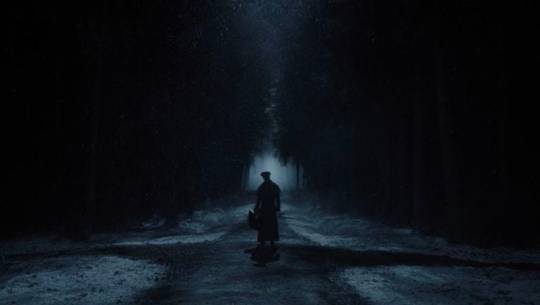
From there, the dark ambiance was spellbinding. The slow zoom-in on the Count’s castle, coupled with the dream-like transition of Thomas magically standing before the massive door, was stunning. The sharp, razor-like music cut through the silence, only to halt as an eerie gust of wind — almost like an unseen force — creaked open the entrance door to reveal Count Orlok. The moment sent shivers down my spine. It’s a moment that will stay with me forever, a haunting masterclass in tension and atmosphere.
Eggers approached the horror aspects of the film with remarkable taste, steering clear of cheap jump scares used solely to startle the audience. Instead, every moment of brief, intense fright was thoughtfully crafted to enhance the story and deepen the fear surrounding the character. Even in moments where the audience might brace themselves for a predictable jump scare, Eggers subverts expectations, delivering something entirely different — and far more unsettling. This deliberate approach not only heightens the tension but also solidifies Orlok as a truly haunting and unforgettable figure.
As I mentioned earlier, I loved how the film seamlessly incorporated classic Gothic horror tropes into its storytelling. From the isolated and decaying locations to themes of madness and obsession, every element felt perfectly woven into the narrative. And, of course, we can’t overlook the biggest trope of them all: the mysterious and brooding character — Count Orlok.
Portrayed by Bill Skarsgård, Orlok was both unrecognizable and darkly enchanting. Every scene he occupied felt like his shadow consumed the screen, dripping with hunger and decay. I was thoroughly impressed by how Eggers chose to depict him, creating a character that not only stirred the Gothic sensibilities of the story but also caused quite the stir in pop culture.

Sharing the screen with Orlok was Ellen, portrayed by Lily-Rose Depp, whose performance absolutely blew me away. Together, their dynamic added yet another layer of complexity and intrigue. their relationship is a haunting interplay of forbidden desire, manipulation, and fate. It embodies the Gothic trope of a doomed connection where love and death are inextricably linked. Ellen is portrayed as a figure of innocence and purity, yet she possesses an underlying strength and agency that makes her more than a passive victim. Orlok, on the other hand, is a dark, brooding presence — a predator consumed by his hunger yet strangely drawn to Ellen in a way that goes beyond his vampiric instincts. Their dynamic is one of fascination and revulsion, as Ellen becomes both prey and something far more meaningful to Orlok.
Orlok’s obsession with Ellen undeniably transcends his monstrous nature, adding a layer of tragic complexity to his character. His attraction to her is not just driven by his vampiric instincts but by something far deeper — a longing that borders on the eternal, and an understanding that their connection is inescapable. Ellen, in turn, is not merely a passive figure caught in his thrall; she demonstrates a profound awareness of the darkness that surrounds her, and a willingness to confront it despite the cost. As the narrative unfolds, it becomes clear that Ellen is not only grappling with Orlok’s manipulation but also her own internal conflict. Their relationship is not one of simple victimhood and control — it’s a tragic interplay of desire, fate, and the inevitability of death. The chemistry between them is undeniable, a magnetic force that pulls them together despite their differences. They are bound, as Orlok himself states, — a fate that is sealed by their shared connection, woven into the fabric of their existence. Their bond is not just a matter of survival or domination; it is, tragically, a fated love, marked by both darkness and an impossible longing.
There has been an ongoing discourse online suggesting that Ellen is a victim of abuse, both in her past and through Orlok’s manipulative nature. While I partially agree with this interpretation, I believe it oversimplifies the dynamic between them. Yes, Ellen’s past may hint at a history of abuse, it’s also evident that she harbors a darkness within her, a force so strong it metaphorically (and perhaps literally) summons Orlok from his slumber.
Orlok’s manipulative tendencies cannot be denied — he is a creature of power and control — but Ellen is drawn to his presence, even as she recognizes the danger he poses. This gives her agency within the narrative, positioning her not simply as a victim but as a complex character navigating her own inner turmoil and desires. Their relationship is deeply Gothic in its nature, built on a foundation of forbidden desire, tragedy, and an almost predestined connection that blurs the line between love and destruction.
This dynamic shifts significantly after Ellen meets Thomas (Nicholas Hoult), who serves as a symbol of light in her otherwise dark and twisted life. As stated in the film, Thomas made her feel her most “normal,” momentarily quieting the darkness within her and giving her a fleeting sense of peace. However, by the time he entered her life, it was already too late. Ellen had foolishly sworn her passion to Orlok, binding herself to him and leaving her caught between two opposing forces — a spectrum of light and dark.
There’s no denying that Ellen’s darkness exudes from within, consuming any light she might possess. While Thomas eventually grew to understand and accept Ellen’s dark thoughts, he could never truly comprehend her in the way Orlok does. Orlok, embodying the very essence of her inner turmoil, resonates with the parts of Ellen that Thomas could never reach — a connection both unsettling and deeply intimate. Their bond transcends mere understanding; it’s a shared darkness that binds them in a way no one else could.
This duality is one of the film’s most beautiful and poetic elements. To Ellen, her two romantic interests represent a yin-yang dynamic: Thomas embodies light, purity, and hope, while Orlok is the darkness, passion, and decay that consumes her. Yet, rather than these forces simply opposing each other, they coexist within Ellen, driving her toward her ultimate redemption and Orlok’s demise.
One scene I found particularly beautiful was the medium close-up shot of Ellen in her mourning clothes, with a large black bonnet elegantly framing her face, symbolizing grief and finality. As she discusses her destiny with Von Franz (Willem Defoe), there’s a haunting serenity to her demeanor. In that moment, it feels as though she fully accepts the inevitability of her fate, quietly mourning her own impending death with a sense of tragic dignity.
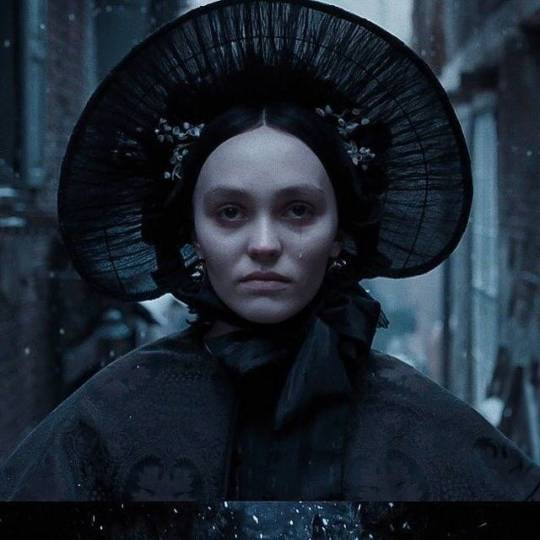
It’s a testament to the power of destiny, passion, and the inescapable pull of fated love. In the end, Ellen’s journey is as tragic as it is profound — a stunning exploration of love, sacrifice, and the interplay between light and shadow. Beautiful and poetic, to say the least.
Wrapping this up, I wanted to highlight one of my favorite scenes in the film, starting with Herr Knock’s (Simon Mcburny) moment when he bites into the flesh of the bodyguard’s neck. Blood splatters across his lips as he screams, “BLOOD IS LIFE,” a line that perfectly encapsulates the film’s overwhelming sense of hunger and craving that must be sated. It’s a visceral, chilling moment that reinforces the darker, primal themes throughout the movie alongside its most iconic line.

Oh, and Eggers is set on doing a Labyrinth remake/ sequel? what do you guys think of this?
#nosferatu#nosferatu 2024#robert eggers#film#movie#film review#count orlock#ellen hutter#nosferatu 2024 spoilers#thomas hutter#bill skarsgård#lilly rose depp
23 notes
·
View notes
Text
The First Slam Dunk fansub
Proud to release my very first fansub for the return of Animation Night.
So what is this movie? The short version is that The First Slam Dunk is the best sports movie I've ever seen.
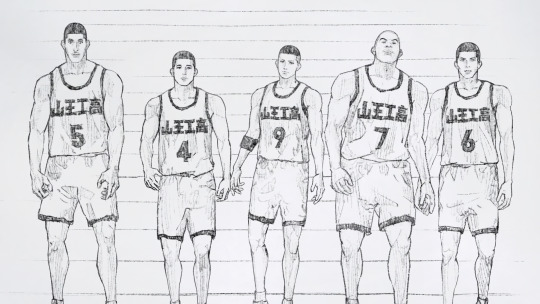
A slightly longer version: it's an incredibly intense, sharply choreographed game of basketball - intercut with the story of our boy Ryota, who struggles to live up to the shadow of his dead brother Sota, not helped by the fact that his mother is not dealing with it well. Growing up a taciturn outcast, Ryota at last finds solace in basketball, where he finds a new purpose as he and his comrades in the no-name Shohoku basketball team find their way to unexpected success. Now, he stands to achieve his brother's dream - to beat the as-yet undefeated Sannoh team. But the Sannoh boys want that win just as badly, and they live for basketball.
After seeing this movie you'll get why.
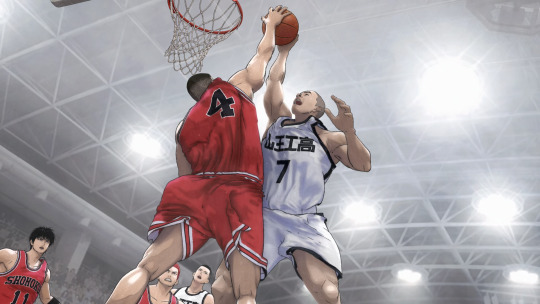
Slam Dunk is a wildly popular and long-running sports manga, previously adapted to anime by Toei in the 90s. The original story followed delinquent yankii goofball Sakuragi, who finds a new life in basketball. This movie aims to open it to a new audience - it retells the story from a different perspective, changing the emotional beats as it moves our view from goofy Sakuragi to troubled Ryota. The original mangaka Takehiko Inoue directed it after he was impressed by Toei's efforts to bring the characters to life with CG. It sports (haha) a unique look in anime, blending 2D and 3D animation with a really gorgeous manga-like shading style and effects.
The result is a film with the tight cinematography of manga panelling, the complex 3D motion of CGI and mocap, and also the clarity and snappy timing of animation. The result is, above all, readable. I honestly don't know a thing about basketball, and yet, I could follow every move - even in French.

Then add an absolutely killer soundtrack and masterful pacing and you end up with something truly special. It was one of my favourite movies at Annecy last year, and now it's finally out on BD.
So, in the interest of letting more people enjoy this movie, and also because I really wanted to try my hand at it, I made a fansub! It ended up an incredibly involved project - I retimed every line of dialogue, tracked dozens of signs in Blender, and generally went just completely all out on this one. Couple of all nighters may have been involved.
Here's some screenshots of some of the more complex typesetting:
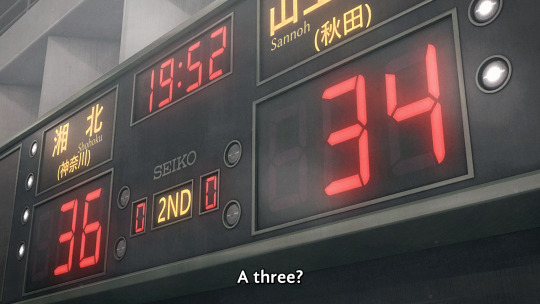
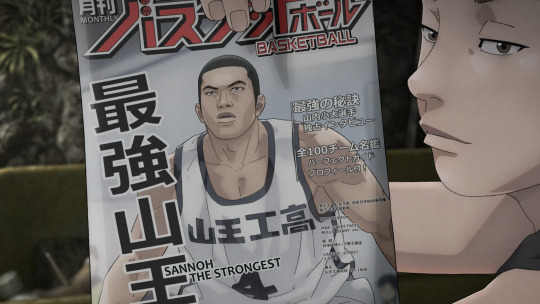

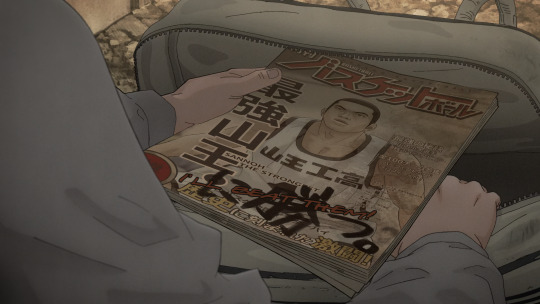

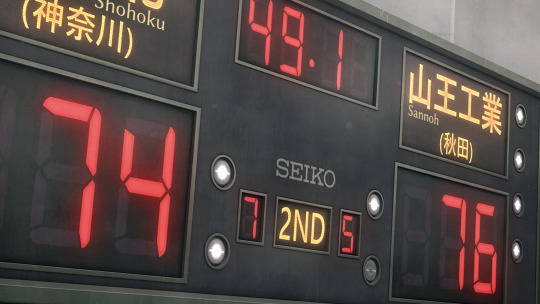
If you'd like to watch it together, I'll be staging a group watch at 7pm UK time (three and a half hours from now). Tune in to twitch.tv/canmom - I'd love to see you there! And if not, well, the torrent is above, enjoy <3
105 notes
·
View notes
Text
WHO MV ANALYSIS: BRILLIANT STORY TELLING, QUEER CODING AND MORE
I have a lot to say. And yes i positively feel like a clown that this post comes right after jimin said "go ahead, misinterpret everything hehe". This might be a long one, so settle in. Also, if you are looking for this as some kind of validation for any ship, I'm afraid it might not serve that purpose (BUT keep reading!). This is simply an analysis of MV elements and cinematography in its purest form appreciating the brilliant work done by Lumpens and his assistant directors.
Part 1: Start of the story of a man in search of love
Let's start from the very beginning. Many of you have already figured out that Jimin is telling a story here (I'm not wrong yet Jimin, dammit). How do we know this? Look at that mini TV. Yes, this mini TV is actually our bookmark, our storyteller. In it's first appearance, it says "play" with a man walking at a normal pace, imitating jimin here, who is also walking.
Elements to notice here:-
The 'ONLY' signs on the road which mean these roads have only limited accessibility when it comes to directions. In my opinion, it symbolizes the rules that this world imposes on us. And here comes jimin whining/asking why he hasn't met 'her' even if he sees her at night? (imagines her) and thinks about her.

2. Also notice how it says "BLISS" on the neon sign but the world he's in is basically pre-tornado winds - there are papers flying, cars on fire, safety barrier tapes, even the mini TV is on fire. The flyer for the song says "who is!! Tornado of love" and basically serves as a warning that the 'tornado of love' is approaching soon.
3. Reference to 'Closer' (than this?) on the billboard with a man on it. Looks like a reference to a movie or song of 1995 which I haven't been able to find out yet. [help me]
Part 2: Searching gets more desperate
Moving on, we see Jimin entering the part of street with an old, dilapidated building in the background (so much to notice here!!)

Elements to look out:
Firstly, look at the mini TV which still says 'play' but the man in the TV is now running instead of walking. Just like how Jimin's steps are faster now, he's on his search for 'her', but he's getting desperate.
Notice the engineers in the background? Yes they are engineers- they have plans, measuring devices etc. And they are working to "renovate" the building. Interesting choice of scene right before a tornado... let's found out why-
Notice that on the right side to the entrance of this building, there's "B-1" written on the walls, but one could also read it at "13 1" At first glance, that's what it seemed like to me. I think people renovating a building whose name looks like a "13" is symbolism for jimin trying to heal/renovate/repair his heart/emotions/past traumas. It's about him still being in that phase where he is healing/ trying to heal himself by trying to find 'her' OR maybe he's trying to find 'her' when he is not even completely healed himself.
See the TV on the shopping cart on fire because it will be referenced later. Put a pin on it.
Part-3 Theatrics
With a flash of retro cable TV like lights, the perspective changes - as in now you are watching inside the mini TV. I'm talking about this part, when he changes direction and goes to the girl. So many interesting things happen, I'm giddy thinking about writing it.

Elements to notice:
I can't help but think of the words 'auto calibration ' that flashes right before Jimin does that cunty choreo with the female dancer. 'auto calibration ' literally means 'standardization' or 'correction' . I don't think people realise how queer coded it is. 'coded' being the keyword here. It could also mean 'standardized' as in the way we view idols as these perfect people with perfect dating lives.
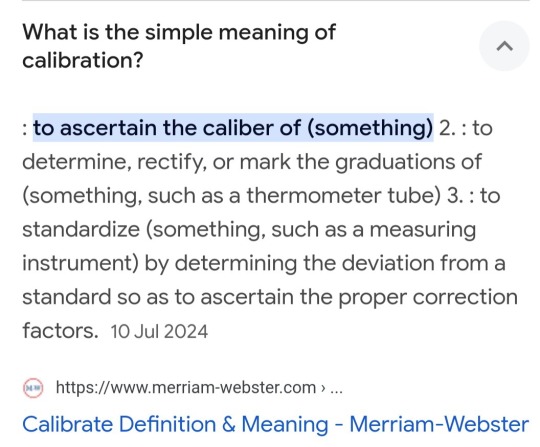
3. The car is on fire- so yeah whatever is happening cannot be good. Everything is still chaotic and doesn't make it easy
2. The mini TV now shows various images with a heart '<3' symbolizing that he is engaging in some kind of relationship, but this is literally the biggest 'drama' ever. Because look at this scene- it's pure cinema..
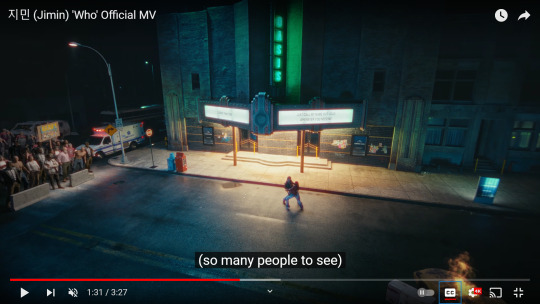
"So many people to see" - people watching them date/engage while making a whole show out of it. There's also an ambulance nearby because obviously an idol's dating life shown to the public can leave people hurt and offended. As Jimin and the girl dance, they are literally in front of a local theatre called the 'OASIS'. My interpretation is that a celeb's dating life is literally 'theatrics' for the public. They are reduced to nothing but characters for entertainment, and worst part is that the public isn't happy either. No wonder, making it extremely difficult for Jimin to find true love. Special mention where the girl has him in a chokehold, quite literally an uncomfortable position, entangled with each other- or at least that's how the public views them.
3) In the same scene we see that the mini TV has tumbled down along with the shopping cart which was on fire, hence setting the car on fire too lol. Brilliant attention to detail.
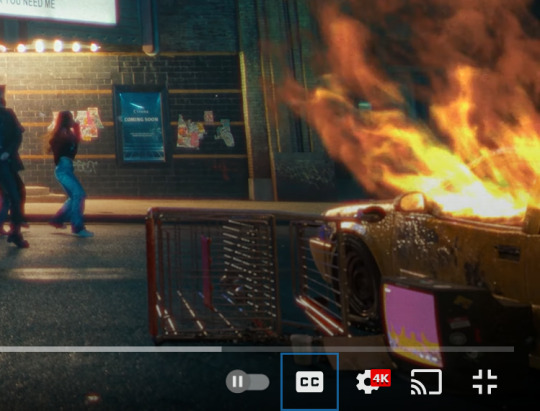
Part-4 - where Jimin gets more desperate to find true love (in the past!)
As soon as the dancers leave, we see the huge billboard fall down and if i go with all the clues we have been getting, especially the travel show...it is WILD.
Because people are focusing on the possible OST called "Keep going", but DO YOU NOT REALISE HOW HUGE IT IS THAT JK IS REFERENCED IN A ROMANTIC SONG? dropping from the sky with 'who' written on it??!! "Who" without the questions or exclamations. I'll let you go delulu mode on that one. Moving on-
You must have noticed that to show a change in phase/scene, they have used multicolored flashes and change to 90s TV perspective. The same happens now after the billboard drops but the important thing to notice is the "rewind" on the screen now. Which basically means jimin going through different people is a thing of the past.

3. The crow/raven seen multiple times in the MV. Either way, a crow or raven is not something we see at night. They come out only at times of 'unnatural exceptions' like storms, earthquakes etc because they are not nocturnal creatures. While Jimin was trying to find love, there was definitely something happening which wasn't natural for him or was out of his comfort zone/he was not himself.
4. Another instance of queer coding I noticed was both men and women walking past him, similar to Like Crazy MV. It had a different symbolism in LC because he was trying to stay in the dream. But here people walking past him clearly means possible romantic partners. And he keeps stopping, keeps trying his luck with different people, almost always failing. OR- it could mean there are people of both genders walking past him but he never goes for the men in the past.
Part-5 - The tornado of love finally arrives
Now it says 'Play' on the screen meaning we are now in the present again. The tornado has built up, Jimin looks more confident, more smug as the tornado gains momentum behind him.

A flash of light, fireworks erupt as he sings his heart out. Even after the tornado is completely gone, the sparks and short circuits and destruction continues, meaning the 'tornado of love' arrived and certainly did a number on him.
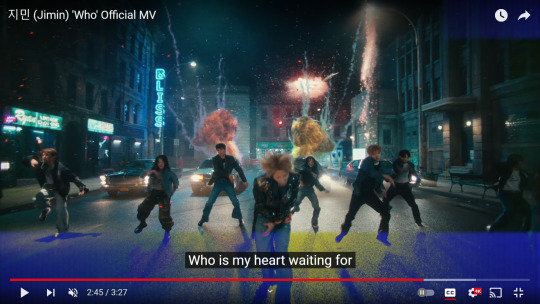
Finally, we see him on a much calmer path. All cars lined up. He owns his life now. The situation is under control, the cars with lights on, ready to go.

I truly appreciate the storytelling in WHO MV. Lumpens Sir delivering as always. And I would love to know which things were Jimin's ideas but he wouldn't share that with us would he?

Let me know what you think and discuss in the comments if you want to.
43 notes
·
View notes
Note
This is a little rambly, but: Do you have any tips for people who are trying to re-learn media literacy skills? It’s kind of disheartening to see the number of people I’ve seen in the arcane fandom on high horses doing the point and laugh at someone else for missing the deeper meaning/metaphors/symbolism. It’s alienating to be humiliated like that you know? (Maybe I’m just still fresh jn my post-election grief but it just reminds me of how, when someone becomes open to new viewpoints and new perspectives, we should meet them halfway and encourage these new questions and developing skills, instead of antagonizing them back in the other direction. Does that make sense?)
Hi nonny!!!!
First of all, I wanna say that these are some great questions and I'm truly flattered to have been asked! I can't say I'm a total expert here, so if anyone reading has other tips, please leave them in the reblogs or comments.
Second, you're also so right that nobody should be pointing or laughing at someone who doesn't "get it," if the person who didn't "get it" is giving their genuine analysis and is open for discussion and other viewpoints. It's when folks on either side of whatever the divide is slinging start insults that conversations become unproductive--which in and of itself is not conducive to media literacy. I am so sorry you've felt alienated by any of the back and forth happening; that doesn't feel good for anyone.
There are four pieces of advice I'll give. (and this is NOT assuming you're not doing these already, nonny!)
First, consume a lot of media. Read/watch/play with abandon. Consume things that are easy, consume things that challenge you. Reflect on them. Nothing fancy needed there. Ask questions--what is this trying to show me, and did it work? How could it have been seen differently, and why do I disagree with that view? Having a bigger reservoir of experience helps you evaulate everything you consume thereafter!
Second is pretty simple--pay attention. If you're planning on actively engaging with a piece of media, of course you've gotta actually immerse yourself in it! I'm guilty of being a phone-scroller while watching some things, but it's a detriment to getting the full picture of what you're watching or playing or reading. To be able to ask the questions, you have to do the work.
The third tip I'll give is to familiarize yourself with craft, whether that's writing, cinematography, etc. It helps you recognize the hows and whys of technicality, and allows you to evaluate what was attempted and what succeeded, or did not succeed. This also helps you take genre expectations into account as you assess the story's/creator's intention versus execution.
Finally--and this ties in with your concerns--allow yourself to think about other viewpoints, even if your own evalutations don't change.
One thing I'll say about Arcane in particular is that the long (and necessary!!!) development cycle led to folks having a close-held ideal of what the next season would look like--and when reality falls short of what they built up, that hurts. Such an impactful show means a LOT to people and it's unsurprising that it's bringing out a lot of strong convictions.
#please don't tear me apart i tried my best!!!#please offer more or offer counterpoints i'm listening too!
17 notes
·
View notes
Text
As I have nowhere else to freak out, I come to Tumblr with my feelings about Anne Rice’s Interview With a Vampire both seasons.
First of all, from a writer’s perspective, the show is just *gestures vigorously in various directions* so good! In every *EVERY* way! The characters, the dialogue, the pacing, the perspective switches, the word choices. You can tell that every piece of this show was put together with *intention.* The way that season 1 and 2 are connected shouts that the writers have planned this story, and just in such a way that follows the books. It is obvious that the show has taken liberties to tell the same story but emphasizing certain themes. And they *know* that these choices change the story in very meaningful ways and apply it to not only how it affects the story but how they tell the story. And it’s so fucking delightful! In season 2, toward the ending, there is foreshadowing for a 3rd season and I’m so excited to see how they interact with the story after the first arch of Anne Rice’s book.
The casting for the show is brilliant. The actors seem to truly care about the story, not just having a job. The way that they are enthusiastic about vampires in general but their characters, the way they have their own personal attachments to their characters’ perspectives in the story, the way they get along with each other. It’s so fun to watch. And they do such(!) a fantastic job too! Like, guys, it’s fucking art! Something that I love about the show so much is how it recognizes well that it is a TV show and takes every advantage of that, with the formatting and pacing but also the acting. Every scene has multiple purposes and so every character scene has multiple emotions and plot reasons for showing these different reactions. The show knows itself well enough that it doesn’t have to worry about sticking to genre conventions so there are happy moments and deeply tragic and intense moments but no one scene is just sad or violent or funny. The actors know their characters and the story to the extent that they aren’t just following the directions and putting their own spin on the character but telling us the story of their character inside the larger story.
You know how in the 3rd season of Bridgerton Collin’s character changed so dramatically from how he was in the past 2 seasons. This is because the writer’s didn’t have a larger plan for him, they didn’t know how they wanted to tell his story, they didn’t even know *him* well enough to give him graceful transition from side to main character.
The writers for IWAV don’t only know each character’s story, don’t only know each character separate from another, they know how the characters see each other well enough to be able to *emphasize* the differences from one character sees them to how another does. And the actors are so fucking good at their characters and care about the story enough that the way they move is part of the storytelling.
The cinematography has meaning, the costumes have meaning, the lighting. Also the costumes. They tell a story because 1) this story is set in both modern and past historical times, 2) each character has their own style, and 3) the way they dress is symbolic of the character’s arch/mental state.
There’s more but 5AM and I am currently out of thoughts
#interview with the vampire#louis de pointe du lac#lestat de lioncourt#claudia#armand#anne rice#vampires#freaking obsessed#I need us to talk more about the ART#of the production#the inspiration#the symbolism#gay vampires#when the writers actually know what they’re doing
34 notes
·
View notes
Text
Tibetan Sea Flower (藏海花) Drama Review or Why I Think It’s a Laundry List of Crimes Actually
Because somebody had to do it
So the Tibetan Sea Flower (or 藏海花, or Adventure Behind The Bronze Door) drama, meant to be adapting the Tibetan Sea Flower novel, first sequel following the main eight volumes of Daomu Biji, has been out for a while now, and I finally got around to actually finishing it. And I have Many Things to say about it
That I can tell, a lot of people in the English-speaking part of the fandom have praised it for various reasons, and while I’m glad there are people who enjoyed it, I’m not one of those people, so for the sake of variety of opinion I thought I’d share my thoughts about it. I could honestly write an essay because that’s how many crimes this drama committed in my opinion, but no one wants to read All That so this is going to be an attempt at a highlight reel
TLDR; Tibetan Sea Flower is firmly at the bottom of my list of DMBJ adaptations with Lost Tomb 2.5. It’s only slightly above that because unlike Lost Tomb 2.5, Tibetan Sea Flower has a few redeeming qualities at least
First off, some things I did enjoy, or if not enjoy, that I can appreciate in a “there was a vision” sense
My favorite part of this drama was the first 4 or 5 episodes, and the choice to start with the tail end of volume 8 of the main story was a smart decision in that it gave a lot more emotional impact leading into ZHH proper. The start of the drama is fast-paced without feeling rushed, and while my opinion on the ZHH drama isn’t entirely based off of doing a one-to-one comparison with the book (mostly because adaptations inevitably change things to adapt to a new medium so they can’t and shouldn’t be one-to-one copies), the fact it followed the book to a T was a touch I appreciated. The cinematography, directing, and music for the most part are also a strong point this drama has going for it. I can also appreciate that the PingXie married vibes were off the charts to the point where every single time someone said ���you’re the patriarch’s chosen one/friend” they might as well have been calling Wu Xie ‘Zhang furen’ it would have been the same thing. The addition of Ten Years Later (and the Fishing King extra which isn’t really an extra anymore since it’s been published as part of Ten Years Later) is also a decision I can appreciate in theory, and from a storytelling perspective makes for a fulfilling and thematically relevant ending. Chen Minghao as Pangzi also almost single-handedly carried the entire drama, iconic, thank you for your service king
Now that that’s out of the way, I can get into the meat and entire point of this post, that is some of the multiple crimes the ZHH drama committed because trust there are Many
I think the fact it started out so strong to me is what makes the rest of it worse. I’m not even sure if I can actually coherently explain the extent of the psychic damage this drama gave me by the time I finished it. There are sometimes significant differences between the drama and the book, which is something I expected because it’s an adaptation, and departures from the source material aren’t necessarily a bad thing. So it’s not that it’s different from the book that’s fundamentally a problem for me. What is a problem, however, is when an adaptation decides to make choices that fundamentally compromise the integrity of both the characters and the overarching plot. I don’t tend to expect anything from DMBJ adaptations, mostly because in general their quality varies, and they’re the main source of the misconception that DMBJ canon is a mess of inconsistencies and lack of cohesion when the original source material is by opposition generally both consistent and cohesive. The ZHH drama is one of those drama adaptations that decided to take the equivalent of a sledgehammer to everything from characterization and lore to any hope of cohesion between it and either the other drama adaptations or the books
The Zhang family lore takes the biggest hit. The casual obliteration of it is probably my biggest beef with this drama, and I can already hear people saying “but it’s not obliterated if it’s thematically adjacent, it doesn’t have to copy the book!. Now listen. It can be thematically relevant and not need to copy the book without creating completely unnecessary plot contradictions with the rest of the story, and as far as the Zhang family lore reworks are concerned, some of them aren’t even thematically appropriate, and sometimes are done in a way that’s?? Honestly baffling to me. Zhang Nian’s entire arc and existence is one of those, because he manages to make himself and the entire subplot that stems from him completely irrelevant by episode 20 where the drama just goes “...so anyway!”
There’s also the choice of having the tianshou (or the heavenly gift) be some sort of bug poison/disease that’s implied to be the only thing holding the Zhang family back from being “free” and living a normal life, and so from the moment Xiaoge decides to take on the mantle of Zhang Qiling for his own personal reasons (which is another issue I have), he alone bears the weight of the heavenly gift, and the rest of the family either disperses into living perfectly normal lives, or is at a bit of a loss as to what to do, which while this last bit is true to some extent for the overseas branch in the books, it stems from circumstances forcing them rather than a goal they wanted to achieve. I’m going to be very generous in blaming this change on censorship, but this alone, surface level as it is, is already contradicting the Zhang family’s most important thematic relevance in the story beyond the lore itself: the fact that they’re meant to be a family led astray by their own hubris and isolationist elitism, eventually switching gears from re: Queen’s Banquet an ancient people likely cursed by primordial entities beyond human understanding into becoming Other and seeking a cure for that, to a widespread and powerful clan pulling the strings of an entire empire for centuries upon centuries seeking a way to achieve true immortality
In the books, the Zhang family’s downfall is their own hubris that blinds them to their own failings to the point that eventually they lead themselves to being wiped out entirely by the Wang family, at least as far as the main branch is concerned. In the ZHH drama, their downfall isn’t even a downfall so much as it’s like they decided to retire and are having post-retirement depression. Zhang Nian is a pawn for the Wang clan, and in that sense he’s “relevant”, but his story is long-winded at best and undermines the impact and importance of the Wang family itself that ends up becoming a barely relevant footnote much like Sand Sea itself
The only thing I’m willing to believe is that Xiaoge either suffers from a more powerful version of the tianshou or is the only Zhang family member at present that suffers from it, mostly because we have no other living members of the main family alive to know if the tianshou ever became a burden Zhang Qiling alone carried for the rest of the clan. I’d be here forever if I started getting into how the ZHH drama somehow managed to lowkey retcon the Zhang family lore that was hinted at at the end of Queen’s Banquet, but it’s impressive how it managed to do even that. By the time it reached this point in episode 31 I was honestly just head in hands
Characterization issues in this drama also exist, and the three characters who suffer from it the most are probably Zhang Haike, and to a certain extent both Xiaoge and Wu Xie. Zhang Haike’s character is changed to the extent he might as well be a different character altogether so I won’t bother going into detail or I’ll be here for a while (TLDR; more or less erasing the fact he wears Wu Xie’s face permanently erases the somewhat antagonistic and overall complicated relationship he has with Wu Xie), but Xiaoge and Wu Xie have smaller changes that create contradictions down the line
Despite the drama mostly (but not entirely) disproving that Xiaoge specifically chose Wu Xie to carry on the task of tending to the tibetan sea flowers, it doesn’t discard the possibility entirely, which creates a number of problems, namely the fact that Xiaoge’s entire reasoning for going behind the bronze door in Wu Xie’s place and pushing him away the whole way up Changbai Mountain was to try and push Wu Xie out of tomb robbing and conspiracies altogether. Xiaoge sets up contingencies to help Wu Xie if he reaches specific points of no return, but going behind the bronze door is essentially Xiaoge doing the exact opposite of choosing Wu Xie to do a task, he’s aggressively unchoosing him. He also doesn’t ever relegate his duties as Zhang Qiling to other people
The same goes for the reasoning behind Xiaoge becoming Zhang Qiling being a deliberate move to help him find out who his parents are. This I can’t entirely discredit simply because the Three Days of Silence extra (the story of Xiaoge meeting Baima) gives no specific timeline or indication of his reason for going to the Jila temple besides that he was looking for a woman but he didn’t know who she was, and ZHH the book itself never talks about the circumstances behind Xiaoge becoming Zhang Qiling. The early main books place emphasis on Xiaoge’s driving force being discovering his identity and by extension his place in the world, so it’s not impossible to consider that might have been the case when he was a child as well. This is mostly vibes and not so objective, but the vibes are different, and to me Xiaoge becoming Zhang Qiling carries something more akin to a lamb offered as a sacrifice that accepts the role it’s been given, coupled with stepping up to a duty the Zhang family had essentially abandoned by that point, as opposed to doing it for strictly personal reasons. The same goes for the entire reasoning behind the tianshou wanting to kill Zhang Haike’s wife and taking control of Xiaoge to do so, because there’s irony in making Xiaoge, historically the least traditionalist Zhang alive outside of his actual duties as Zhang Qiling, Zhang family traditionalist number one via tianshou as if tianshou ever cared about the Zhang family’s isolationist politics or other earthly forms of power or symbols
Wu Xie is more complicated in that part of the problem for me is that I don’t particularly like Zhang Luyi as Wu Xie. Or in general as an actor. I’m aware this is a personal preference, but a lot of the more emotional moments were lost on me because to me he simply wasn’t conveying whatever emotion was meant to be conveyed convincingly. The biggest issue I have with Wu Xie’s portrayal outside of that is the subtle erasure of his character development. Reducing the Wang family’s relevance and impact cheapens their importance in the overarching story, which in turn cheapens the Sand Sea plan and its extreme difficulty, and the heavy personal cost of it for Wu Xie, which takes shape in the changes to the origin of his self-harm scars. Again, changing things from the book is fine, but when it alters what I consider to be a fundamental element in a character, it becomes a problem
The ZHH drama makes a point of showing that the first two scars that Wu Xie gives himself stem from what’s basically survivor’s guilt. He failed to protect the Zhang family, like he failed to prevent a situation that forced the Yinshaluo (I’m not sure that’s the name of the tribe considering all the place names in this drama are fake) warrior to sacrifice himself to stop the storm. Wu Xie punishes himself because he feels he failed, because he felt like he could have and should have done better. There are elements of that in the reasoning behind his scars in the Sand Sea book where their origin is explained, but the fundamental difference is that ZHH drama Wu Xie’s actions and reasoning come from a place where survivor’s guilt aside, he’s not objectively to blame for situations beyond his control, and in that sense, he’s “morally good”. Sand Sea book Wu Xie’s actions and reasoning come from the perspective of a man who deliberately orchestrated events in which he manipulated various people into becoming his pawns on a very high risk chessboard. Each scar represents a bad choice of move of the pawn that resulted in the death of his chosen sacrifice, so the element of failure is there, but the difference lies in the fact that contrary to the ZHH drama where he fails to save people, in the book, the people behind the scars are his victims that he willingly led to their deaths. He punishes himself because it’s his way of tolerating the intolerable from himself. Wu Xie’s amorality for the greater good in Sand Sea is such an important facet of his character, and by shifting the origin of those scars, it takes away from that element that the ZHH drama doesn’t hint at at all, or barely
There’s so many more things I could get into about this drama, like how paralleling Wu Xie and Xiaoge as being similar feels like a fundamental misunderstanding of their characters because them being different is the entire point. It’s doubly ironic when NPSS said recently that the entire point is that they’re entirely different people who only after the ten years have passed meet in the middle where their trajectories truly parallel each other: one of a man who went from a god to a man, and one of a man who went from man to god. I could talk about how Mama Bear Pangzi is a carry-over from the Reboot drama that doesn’t accurately reflect either what Pangzi is like in the books or how his dynamic with Wu Xie functions in them. I could talk about how despite there being good intentions in adding those scenes, shoving in as many impactful moments from the main story and Ten Years Later + Fishing King as they possibly could ended up feeling like boxes were being ticked off a list and it took away from their impact to the point some of those moments felt off or bland. It didn’t help that whether it was a directing issue or a filming issue (not an acting issue because Zhang Kangle was overall a good interpretation of Xiaoge), Xiaoge had practically no actual chemistry with either Wu Xie or Pangzi. I could talk about this drama’s pacing issues where it yo-yoed between going fast then excruciatingly slow. I could talk about the irony of an adaptation managing to both take a sledgehammer to the source material in a way that’s honestly criminal, yet ironically also being one the least newcomer friendly DMBJ adaptations
It’s safe to say I won’t be watching the ZHH drama again. This post exists mostly for the purpose of expounding on why I didn’t like this drama despite its strong start instead of just saying “it was bad”
#dmbj#tibetan sea flower#adventure behind the bronze door#meta#something of a review#i really could go on about this drama#i honestly had hopes for it in the beginning#but there came a point where it just kept getting worse and worse until watching it became a chore#i'm glad there are people who enjoyed it but i think i just wasn't the target audience#and not to make this a books vs drama people thing#but that i could tell from talking to different people on different platforms#and what's been said on weibo and dmbj forums#the books readers in a broad sense were somehow not the target audience either
17 notes
·
View notes
Note
At what point do you ask yourself if the Prequels did this to itself.
Sure having Gen X creatives probably doesn’t help. But I still see a lot of younger folks and prequel kids have a “the Jedi we’re wrong” narrative. We can argue whether or not it’s because of those Gen X creators sure.
But a film or film needs to speak for itself and convey the ideas of the creative and not have people research what he or she says. It can be fun sure but at some point the film needs to do the work.
Course if you think the film does the work that also is a debate worth having. But the fact that we still have this debate at all must say something and I don’t it’s simple as “older fans don’t get it” maybe that’s part of it but I still think there is something about the prequel’s execution to be desired.
Guessing you're the same anon from this post.
It's not as simple as "older fans don't get it", but that is the starting point of the issue, because the older fans are the ones who generated the content that the Prequel kids would go on consuming.
And you can see a trend in all Star Wars merchandise. Around 1999 to 2005? The marketing, the books, the comics, all tend to frame the Jedi in a positive light, but more importantly focus on the intended narrative, that Anakin brought this down on himself.
And the haters, well, they're arguing that the Jedi are a bunch of idiots and incompetents, that Anakin is whiny and changes his mind and joins the Dark Side to kill the Jedi on a whim.
These are very uncharitable reads but at least they track with the intended narrative.
The Jedi are always playing catch-up, calling them "incompetent" is tough but fair.
Anakin is whiny, arrogant and petulant but he's a teenager. That's how they are. That's the point: he's a teenager and he's trying to get married and settle down and have a family, etc, "because i love her and she loves me" when even the woman he's in love with tells him "that's not how things work, buddy, there's other factors, this will spell out destruction for everyone". Eventually she gives in, but that doesn't make it any less destructive.
Anakin does turn to the Dark Side immediately. That's how scared he is. That's how traumatized he is. He hasn't slept in days and he's not thinking straight, he's scared shitless and he's panicking and here's this space sorcerer who says he can stop people from fucking dying?? Of course he'll join.
But the other thing is... those are criticisms coming from an adult perspective. AKA not the intended viewer. Cuz I sure wasn't thinking any of that when I was a kid. I was deep in the story and going along with it. I have a friend whose kid watched the films first, same deal, he's not asking that.
These are movies meant for kids. Is the plot slightly more complex than your average fairy tale? It is. But it remains a fairy tale in, especially considering its target demographic.
And this fairy tale was made by an experimental indie filmmaker from the Baby Boomer generation with a background in anthropology (hence why there's so many mythological callbacks in the films), cinema vérité documentary filmmaking (explaining the cinematography of the Prequels) and editing.
It reflects who he is and what his values are. He's ahead of the curb in his way of thinking, but some of his values reflect the generation he was a part of.
Finally, the films reflect a particular style he's emulating, the 30s matinee serial. Everyone speaks a certain way, sometimes it's bland, sometimes it's straight up corny, but it's all on purpose.
These films kept being scrutinized by people who saw them as "blockbuster scifi films" and reviewed/analyzed them as such.
They're not. They're indie movies with a big budget. They're fairy tales in space.
They're this weird little niche thing that this funny weirdo from Modesto with a fascination for pyschological motifs in mythology came up with. Remember: the first Star Wars movie was released with an expectation from everyone, including Lucas himself, that it'd be panned and despised.
As they years go on, a lot of the adults who hated the Prequels try to do the decent thing and find a way to like them... but the story seems so stupid to them, as it is.
But then they either think or come across an interpretation, a prism through which to see the Prequels... that - holy shit - actually makes them better, and have more depth. The theory is...
What if Jar Jar is secretly a Sith Lord?
What if the Prequel Jedi are meant to come across as dispassionate? I mean, isn’t that what being a Jedi is, apparently? You purge yourself of attachments aka emotions, and act only logically.
Wow, that… that actually makes the Prequels sound better. Like, think of the implications:
The Jedi are too systemic, they’re more prone to violence than they’re supposed to be, they’re meddling with politics, and if you read the EU, they’re essentially kidnapping babies, brainwashing them, indoctrinating them, and if they don’t pass the tests then they become farmers or get kicked out. They’re high and mighty assholes who preach peace but also frequently get into fights. Also, to become a Jedi, you need to have a high enough midi-chlorian count which shows how overly-organized they’ve become, rather than allowing themselves to ‘feel’.
Qui-Gon is not just a maverick: he’s ahead of the curb. I mean, he’s the first guy to become a Force Ghost, he’s gotta be doing something right that the others aren’t, right? Also, he’s got a love interest, he gets angry when she gets killed. Y’know, a human reaction? Like the one Anakin has and tells himself he needs to repress, like a Jedi apparently would?
And you know what? Maybe that’s the problem that makes Anakin go to the Dark Side: these guys took a 9-year-old slave and forced him to repress his emotions until he finally cracked. He just wouldn’t fit in the mold, they kept pushing, until he finally broke. Sure, Palpatine leverages Padmé’s life, but Anakin would never have been in that situation if the Jedi had been compassionate enough to notice he was in pain and distress. Yoda literally tells him to “rejoice” at the thought of someone dying. What kind of idiotic advice is that? It’s clear, the Jedi are no better than the Sith, they’re just two sides of a different coin. One feels too much, the other doesn’t feel at all.
Holy shit… this is all making so much sense…! The Prequels might actually be secretly good! Or if not good, at least more coherent, now!
And oh! Oh! That’s what makes Luke special! Cuz yes, Luke is special again, thanks to this interpretation!
He finds a middle ground between the unfeeling Jedi and the Sith, who have become slaves to their emotions. He uses the Dark Side to beat Vader, but uses it like a tool, keeps himself in control (like some sort of Jedi in the middle... like… a gray… Jedi). Like, sure, Anakin can be the Chosen One, whatever, but Luke? Luke has found the balance, he succeeded where Obi-Wan, Yoda (who wanted Vader dead instead of believing he could be redeemed) and the other Prequel Jedi failed. And the EU books that follow Return of the Jedi seem to confirm this, as you can get married within the New Jedi Order, and Luke can use Force Lightning and he can take on an army of Yuhzan Vong by himself!
Wow. You know what? For all their faults, the Prequels make sense. Maybe Lucas is a genius after all.
Some of the people are in a position where they can create new Star Wars content. So they set out to fix something that, in their view, was broken... but that from Lucas' POV, wasn't. Some of them think they're setting out to clarify a narrative (but are actually focusing on an aspect that wasn't meant to be scrutinized and challenged that deeply in the intended narrative).
And they crank out this content, because Lucas didn't particularly give a fuck about the EU. When they have the chance, they push the new narrative, and nobody stops it because, hey, at least they're engaging with the material, and the original narrative was stupid anyway.
What happens? The Prequel kids grow up with this content being pushed on them more and more.
And they're immersed, right? So when a new book makes Obi-Wan come across as an asshole, they don't think "Obi-Wan would never say that" they go "oh shit, turns out Obi-Wan's an asshole!"
So now THAT generation, that's just going by the canon that was put out post-movies, is slowly but surely growing up with the same interpretation (me included).
There's also a more psychology-aware culture, and more and more Anakin comes across as someone who's being mentally abused by the Jedi. He's got some sort of mental disorder, he's socially anxious. He's not whiny, he's crying out for help. Those values of the Jedi (that Lucas shares)? They're actually weird and archaic!
So that whole aspect gets thrown into the mix.
Fast-forward to today, and the newest generation of fans grows up with "the Prequels show the Fall of the Jedi" as common knowledge, and the High Republic, New Jedi Order and Dawn of the Jedi is where it's at. Those Prequel Jedi are real dogmatic, tight-assed fuck-ups, wow, amirite?
TLDR:
No, I don't think the Prequel Trilogy did it to itself. I think it accomplished exactly what it wanted to for the people it was meant to do it for (kids).
It's just that a bunch of people came right after it and retconned the fuck out of it, then proceeded to say "yeah, it was always this way, even the original author said so" when he didn't.
My stance, as usual, is best summarized by this metaphor:
115 notes
·
View notes
Note
What is your dream college and profession?
hii tysm for the question!! well, if money didn't matter i would definitely study cinematography!! yk i’ve always been passionate about all artistic areas and i've been a storyteller for as long as i can remember and i've always been obsessed with films!! so my biggest dream is to become a great film director and finally bring the stories from my head to the screens but it seems somewhat impossible considering it is an area that is a little undervalued and difficult to achieve success…
my plan b would be psychology as it is also a profession that interests me and i think it adapts more to my reality more at the moment, but i think i still have time to decide!! it just seems a bit uncertain as our minds are constantly changing so even when i finish high school i may have a completely different perspective, but until then i’ll continue writing my ideas on paper <3
7 notes
·
View notes
Text
Mid month dramaaaas, 2024 is giving quality content 🙌🏽
Lovely Runner, 2024 (kdrama) 8.5
FL is a fangirl who goes back in time to save her idol who ended his own life. (very shortly put lol)
I have thoughts!!! It's gonna be long because my expectations with this one were really high. Don't torch me please lol. If I have to be 100%, this drama wasn't what I expected at all. That being said, loser boy Byeon Woo Seok and cutie patootie Kim Hye Yoon were the real deal here. I came for the premise (okay, and because Byeon Wook Seok is fiiiiine) and stayed because of them.
Here's my deal with Lovely Runner. I didn’t read the webtoon or anything, so in my mind, I assumed they would explore what took Sun Jae to make such a decision in the first episode before Sol went back in time to try and fix everything. The drama starts pretty heavy with both main characters attempting in some way to take their own lives. So to go from that to absurd comedy was a bit extreme for me at first. I thought we would do a little mental health introspection here, a bit of commentary about being an idol and all. Then because the first episodes also focused a lot on Sun Jae's dream to be a professional swimmer and the doomed reality that it would not happen, I thought they would center around that as well. I guess I was picturing some sort of mix between 2521 and Twinkling Watermelon. Plus the whole aspect of Im Sol being disabled. But they didn’t really give any more thoughts to these aspects of the characters.
Moving on from my own expectations and a little disappointment that the drama headed in a different direction, I overall enjoyed watching most of it. To be honest, this is the type of drama you just have to go with it, no heavy thoughts included. It gives major classic rom-com kdrama vibes. The cast absolutely takes the cake, the adorable moments are overflowing, comedy hits and the OST is a 10/10.
I don’t mind time travel plot holes but there are still some thing that bugged me, though. One: The whole taxi guy story. I will admit I was extremely disappointed the moment he was introduced. It’s probably when I started lowering my rating. Why do writers (or webtoon authors) feel the need to just randomly pull out these guys? And this drama being so cute and funny... It didn’t need that at all. Specially, since he seemed really poorly written. Two: I might not get over the fact that these two characters both start in really dark places but it’s never really acknowledged in any meaningful way and instead the drama just does a 180° on that. If these subjects hadn’t been introduced then it would have been fine. But in comparison with what happens next, the rest of the drama felt a little superficial to me. Three: it ended up becoming really repetitive. Sol once again ignoring Sun Jae “for his own good”, Sun Jae going after Sol because he doesn’t really care, Sol ending up crying. All this mixed between cute and silly scenes.
Happy ending did make me the happiest, though 🥹
Will Love in Spring, 2024 (cdrama) 9
When they were kids and FL became disabled due to a car accident, ML’s words made her change her whole perspective. He goes on to become the town's mortician, and she becomes a successful saleswoman in the city. And you know the rest, sparks fly when they meet again.
Oof. Cdramas aren’t supposed to be this good, bro. Like… everything about it is just a chef kiss. Characters and their complexities, OST, cinematography, chemistry!! (It's crazy, for real) It presents the same problem as Meet Yourself, even with Li Xian back as the ML. But whereas Meet Yourself is a little lighter and deals with this problem in a respectful and thoughtful way, ML and FL here are filled with angst and tension. The drama itself is a lot heavier, which is not bad, but it's not always nice, and sometimes very frustrating. I saw comments saying that they found the characters to be rather toxic, and that is such a childish way of seeing their relationship. Not everything is red and green flags. This is not that type of drama. People throw the word toxic around everything nowadays. I’d say they were realistic. Both FL and ML make mistakes (because they both have issues) and the drama makes sure the audience knows they were wrong. Because, you know, humans fuck up and stuff. I liked that. But because I can't help but compare it to Meet Yourself, I gotta admit that even though I liked the pace, the OST, and the cinematography more here. MY remains superior, and therefore, I don't feel like I can give it a proper 10. I will say, though, last two episodes gave a bit ot a bittersweet ending even though it's supposed to be a happy one, and I didn't like that much.
Queen of Tears, 2024 (kdrama) 8.5/9
A lawyer from the countryside marries the top heiress of a leading conglomerate. They marry very much in love, but find themselves almost not communicating or holding much feelings for one another three years later.
I completely get why this got everyone hooked. Overall it’s a great story, and very well produced, but at the same time I gotta admit I was hoping for something a little more… exciting. Specially because it was written by the same screenwriter that did Crash Landing on You and The Legend of the Blue Sea and those two were a 10 for me. It might also be personal taste. Some people are into chaebol family dramas that focus on business with their villains cartoonishly evil. Me, personally, I get a bit bored and this is sort of what happened. Even though Kim Ji Won and Kim Soo Hyun got me hooked with their marriage story and the romance of it all, the rest was a bit 💤. Although both families living together was really cute and I loved those scenes. I’d say that’s where the magic of this drama was. The last episodes after her memory gets erased are a bit messy, but the ending still made me sob dramatically lol.
A Good Day to be a Dog, 2023 (kdrama) 7.5/8 (girl what are you doing still here?)
Because of a family curse if FL kisses someone she turns into a dog at midnight… which she does after accidentally kissing a fellow teacher. She can only break the curse if he kisses her again in dog form. The only problem is he’s scared of dogs and doesn’t seem to like her that much.
This is the first time I put on hold a drama and actually go back to finish it lol. I’m proud. This starts off very very cute. Cha Eun Woo but specially Park Gyu Young are really funny and both have great chemistry. The problem here for me is, once again, the past life storyline. I know this is based off a webtoon, but I swear that whole thing is what ruined it for me. I wasn’t into it at all and so the last 4/5 episodes I spent them skipping scenes. Howeveeer, if someone were to ask me if they should watch, I’d say yes. Because romance wins lol.
#lovely runner#queen of tears#will love in spring#a good day to be a dog#netflix kdrama#kdrama#kdramadaily#dovey watches
12 notes
·
View notes
Note
The holdovers is so so good! I’m so glad to see someone else like it on here, what things about it did you like
I know!! I loved it and I’m surprised it hasn’t received more attention, I could talk about it for days!!
Anyway, apologies in advance for the impending essay Anon
SPOILERS: The Holdovers (2023)
A huge part of it is the directing/cinematography. I feel like for me this can make or break a movie and honestly I’m obsessed with the way this was filmed. I love how some scenes are just aesthetic shots of the school; I like that some are more long, dramatic shots of a single character. I think a lot of the shots of the school really add to that feeling of loneliness and isolation that the characters are meant to be feeling, how you see this huge school almost entirely empty save for this small handful of people. It’s especially noticeable in the scene where the kids are working in that huge (nearly empty) room or when Angus is playing the piano in the empty auditorium. I feel like the scene where Angus gets his family photo back is also a great example of this, early in the movie we saw how busy and full of people that hallway was and now it’s just him there alone (which also works really well with the emotion of that scene). Honestly I love just about every creative choice they made with the filming. And I really adore how loneliness is presented - through the dialogue, the staging, and the way the dynamics between characters work and change throughout the movie. I think it’s really well presented in Mary holding Angus’ hand at the end while he’s waiting to be called into the principal’s office. Or how when we get that visibly lonely shot of Angus after visiting his father we can still see Paul in the background behind him, visualizing that he isn’t alone in that moment.
And I love the overall themes of human connection and how even though the characters are vastly different people with very different stories, they still find ways in which they can connect just on a human level. Mary, Angus, and Paul are all very isolated people at the beginning of the movie and by the end they seem to find a sense of belonging with each other. While they’re all isolated for different reasons and struggling with very different things, they still find points of connection because that’s how humans are! By allowing themselves to connect with others they gain perspective and, in the case of Paul more than anyone else, a stronger sense of empathy. It really comes down to the subtle shows of humanity, even in characters that are characterized as being standoffish or outright rude (ie. Angus comforting that other kid after he’d had a nightmare and helping him hide the sheets so the other boys wouldn’t make fun of him). Or how much the dynamic between Paul and Angus begins to noticeably shift after the “Rubicon” incident and the ensuing hospital visit. Moments and subtle shifts in dynamic like that really show that these characters are multi-dimensional and not just the assumptions we make of them in the beginning of the movie
They all develop so much as characters throughout the film, which I think is a great thing to see in any move, but the almost completely character change that Paul has really got me. He went from a hardass teacher with no empathy towards his students to sacrificing not only his career, but really the only stable thing he has in his life, just to keep Angus from being pulled out of school by his mom/stepdad. And that made the ending feel very bittersweet to me. Barton is genuinely the only consistent aspect of Paul’s life, he even says in the movie that he doesn’t know what he’d do without Barton. Of course I think the decision to have him be fired and given the freedom to travel was a great great choice and worked well for his character (especially because it really showcases the dramatic character change of a man who is very stuck in his ways then being forced to change his lifestyle and leave his comfort zone), it ended up being the kick in the ass he needed to live his life the way he’d dreamed of living it. But it does still feel a little sad. I also absolutely adored seeing Mary with her sister and her seeming genuinely happy with her family instead of isolated in her grief at Barton. The symbolism of her giving Curtis’ baby clothes to her sister and her commitment to begging saving a college fund for her sister’s child so that they will never be in the same situation as her son of being unable to afford higher education and feeling that the military was the only option. Honestly Mary’s entire character arc was really beautiful and made me very emotional.
I also love the aesthetic of the movie. I like how they really committed to time period they were going for and how it does feel like a movie that was filmed in the early ‘70s. The clothes, the hair, the dialogue. It just feels very authentic all around, both in terms of setting/time period and in the way that the characters interact with each other. And speaking of character interactions - All of the actors in the movie played their characters so well, but I think Paul Giamatti and Dominic Sessa really killed it, especially for this being Sessa’s first role in a screen production. All of the performances just felt so authentic, so real, throughout the entire movie. It’s easy to feel sympathetic towards the characters because they don’t come across as really one-dimensional characters, there’s so much emotion and growth seen in all of the main protagonists throughout the course of the movie and that really makes them and their motivations feel more understandable.
Also super obsessed with every single line of dialogue. I love how sarcastic a lot of the conversation between Paul and Angus is, I love how many subtle nods there are to certain dynamics or themes, even ones that aren’t fully explored in the movie (ie. Angus making sporadic comments about his family that allude to the fact that his home life is dysfunctional, Mary starting to get more touchy about the music at the Christmas party before she breaks down). So many of the major themes of the movie are displayed in more of the offhand subtle dialogue and through subtext and I felt that it really added to the storytelling and the development of the plot and the characters. The things that each of the characters struggle with privately are a huge part of why they are so socially isolated and so to touch on those things in a more covert way really adds dimension to the characters in a more subtle way until they begin to really open up to each other later in the movie.
And finally I love how they used a mix of songs that were released in the same time period the movie takes place and new songs, as well as the choice to have music written specifically for the movie. I really like the use of music in the movie generally and the way it’s used in the staging of different scenes. I found it a really interesting choice to show Mary having a breakdown in the kitchen as we can hear that “the most wonderful time of the year” is playing in the background. It adds a sense of irony and I thought it a really interesting creative choice. The soundtrack generally was great and I loved it. And the fact that the last song is called See Ya/Into The Unknown also feels like a really lovely choice.
Overall 10/10 a wonderful movie and I am planning to go see it again before it leaves theatres :)
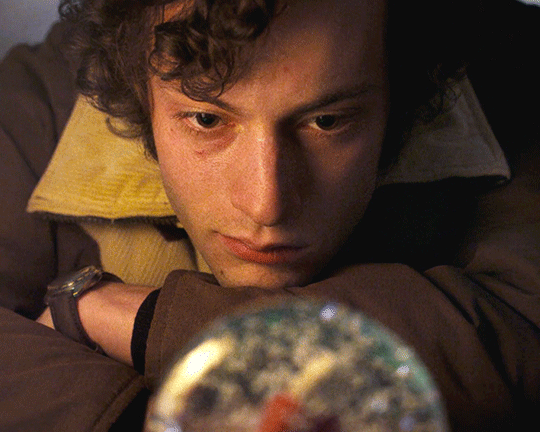
#the holdovers#the holdovers movie#dominic sessa#paul giamatti#davinejoyrandolph#hopefully I will be able to be normal about it soon#unlikely#i’m so obsessed with this movie#the hold(overs) this movie has on me is ridiculous#angus tully#Paul hunham#Mary Lamb#movies
34 notes
·
View notes
Text
hello can you spare a few minutes of your day to see me spiral about dune?
when dune part 1 came out in 2021 i didn't give it any fucking attention, i thought it was another overhyped blockbuster designed to fail (i didn't know it was directed by villeneuve, who i love) and i was sooo sick and tired of seeing timothée chalamet's face and hearing about him
well.
now part 2 came out and it instantly had 93% on rotten tomatoes and 4.5 on letterboxd and people called it a revolutionary cinematic achievement and i was like 😶 damn. maybe i was. cómo se dice. Wrong
so i watched part 1 in my home and i was Blown away by it. i didn't think it was possible for a movie to have cinematography and visual effects THIS good. the story was a little hard to follow but i took my time with it and allowed myself to go back whenever i pleased and wrote out the names and locations and motivations and it helped so much!!!! i fucking love it to bits, and i became so excited to watch part 2 (on a theater!!!!!!! i love going to the theater and i Knew part 2 would be a Theater Movie)
so. i watched part 2. and. i don't even know how to properly convey this but i feel like i had a religious experience in that movie theater. i genuinely feel like cinema was invented especifically so that one day this film could be made. like the entire 120 years of cinema we've had have all culminated in this
by far the BEST movie theater experience i've ever had and i'm soooooooooo invested in this story and the acting and (again) the cinematography and visual effects. what WAS that. i've never seen anything like it. like i'm aware it was a book before and a fucking revolutionary and influential one at that but to be Truly honest i had never even heard about it? like Now i know it inspired everything sci-fi related that came after it the same way lord of the rings inspired everything fantasy related that came after it. but genuinely i had never heard of it and i feel like that's such a shame
but at the same time i'm not sad about it at all bc i'm so glad i got to experience this film with fresh eyes and a fresh perspective and just allow myself to be blown away by it
i don't even have to say anything about the cinematography and the visual effects. we all know they're game changing and will be talked about for years to come bc For Sure they've now become a reference for what blockbusters should aim for at a Minimum
the soundtrack and the sound design. they sounded earth shattering in a cinemark xd movie theater so i cannot imagine what it must be like in imax (and i'm fucking Going to see it imax in the next couple of weeks if it kills me). they fit the movie perfectly and were detrimental for the immersion and the world building
the production and costume designs hello?????????????? they're so unique and so well done and so gorgeous and say so much about the story and the characters and help build the world and immerse the audience so much. everything is so thought out and lived in and just plain beautiful. damn
the screenplay. i'm such a sucker for political sci-fi stories but they're Very hard to pull off and most importantly they're very hard to convince me enough to suspend my disbelief. but this one. THIS ONE. the cautionary tale of a supposed messiah forced into this role that ends up usurping his power to lead the very people who believed in him into war and loss is so. SO poignant and so up my alley i can't believe i haven't seen More stories like it?? but truly how Can there be stories like it if this is one is so complex and so thought out and so satisfying to see unfold??? this feels like it was catered specifically to me, to what I like to see in storytelling and to How i like to see it being done
the acting. we got our zendayas and javier bardems and rebecca fergusons and austin butlers who all fill their roles beautifully and do a fucking A+ job at what they were Supposed to do. like i believed in them every step of the way, they truly were their characters and the movie only worked in huge part thanks to them
but
timothée chalamet. MAN. like i said i was never a huge fan of him and absolutely could not see the hype about him and was so tired of seeing his face everywhere. i truly thought before watching these films that he was cast as the protagonist just bc he's the perfect tolken conventionally cute/handsome young white boy but FUCK ME. fuck me!!!!!!!!!!!!!!!!!! i'm now mesmerized by him. it was so so so important how he started out part 1 looking like this scrawny little boy who didn't know shit about the world. bc that gave him so much room to grow!!!!!!! his pain when having the dreams/visions and his conflict about being the duke's son and later on the supposed messiah, his want to feel a part of Something (and that something becoming the fremen), but later on evolving into this hunger for power and blood. god in the second half of the movie???? he's SO reverential and commanding and grandiose. the fucking way he holds a room in the palm of his hand is astounding, i genuinely didn't think he was capable of that. the way he carries his body and his voice!! the cadance he chose for his moments of imposing his messianic form onto the people is so on point. the scenes where he makes everyone kneel and bow for him made me cry out of sheer grandness of what i was witnessing. passionate cinema representing the journey of this pained boy who evolved into a godlike, tyranic status..............
i wanna live in this world a little longer. all i wanna do is rewatch it and read about it and watch about it and talk about it.
denis villeneuve. the man that you are
12 notes
·
View notes